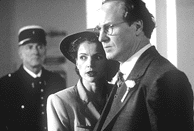The Jewish Week (New York)
Showtime’s film of the heroic Varian Fry is all melodrama, by
 George
Robinson
George
RobinsonApril 20, 2001
[Varian Fry Institute Home] [Chambon Foundation Home]
A Rescue That Never Materializes
The Jewish Week (New York)
Showtime’s film of the heroic Varian Fry is all melodrama, by
 George
Robinson
George
Robinson
April 20, 2001
The trouble starts early in “Varian’s War,” a new film written and
directed for Showtime by Lionel Chetwynd. In one of the first scenes of the
film, set in 1940, the thirty-something, clean-shaven actor Michael Rudder is
portraying the mustachioed, 64-year-old Thomas Mann, trying to persuade Varian
Fry to help get his equally famous novelist brother Heinrich Mann out of
Marseilles, where he is one of many intellectuals and artists at the mercy of
the collaborationist Vichy French government. If Chetwynd can’t get a detail
as simple as this one right, what else can one expect?
Varian Fry was a remarkable man, a Quaker-educated Harvard grad, author of one
of the first detailed studies of T.S. Eliot, a socialist who had seen the
workers’ collectives in Austria and Germany during the 1920s, and a
humanitarian who risked his life on behalf of the Emergency Rescue Committee,
extricating some 2,000 artists, writers and intellectuals from Vichy France in
1940. Among the men and women saved by Fry were such luminaries as Hannah Arendt,
Franz and Alma Werfel, Jacques Lipschitz, Marcel Duchamp and Wanda Landowska.
Out of this potentially fascinating, possibly thrilling material, Chetwynd has
fabricated a cumbrous, sleep-inducing
melodrama that recalls the worst of World War II Hollywood propaganda features,
with sneering, evil Nazis and Vichy French and good guys who range from the
noble to the picturesque, saving intellectuals who are either cute and cuddly or
young and sexy. In order to achieve this dubious end, Chetwynd must
vastly oversimplify Fry’s motivations and blur his background while
simultaneously spending an unconscionable amount of screen time on the
inessential throat-clearing of lengthy speeches about freedom and the necessity
of intellectuals that seem to have been lifted from a 1943 Joan Crawford epic,
all of which he gives a lugubrious pace calculated to induce narcolepsy in the
most severe sufferer from Attention Deficit Disorder.
At the film’s outset, Fry (Willliam Hurt) is sitting down to enjoy a quiet
dinner in a German cafe in November 1938 — oops, it’s Kristallnacht and the
cafe is owned by Jews. After watching a bunch of SS men beating up a young Jew,
Fry dashes into an alleyway to vomit, which is certainly a bad screenwriter’s
most hilarious shorthand for heroic sensitivity. Roll credits.
Understandably, Chetwynd wants to portray Fry as a one-man band, more sensitive
than those around him to the rising threat posed by the Nazis, immediately in
tune with the need to help the elite of Western culture survive their onslaught,
without prompting from the likes of Thomas Mann and Reinhold Niebuhr, both of
whom appear briefly in a scene in which Fry convinces them of the rightness of
the cause. And one willingly grants a filmmaker the sort of dramatic license
that this represents (in fact, according to Anthony Heilbut’s excellent
history of the German refugee artists and intellectuals, “Exiled in
Paradise,” Mann came to Fry and not the other way around). But combined with
an interminable scene in which Fry’s eloquence convinces even his die-hard
isolationist friends to give to the cause, this run-up to the real story of the
ERC’s first mission just adds to the film’s excessive running time, a dreary
120 minutes.
Given a strong cast, headed by the usually reliable Hurt, one would expect that
good acting might redeem this project’s shortcomings. Regrettably, it just
doesn’t happen. Hurt plays Fry as a fussy collection of tics, kitted out like
an Oscar Wilde imitator. Julia Ormond, who plays his street-wise assistant, is
too busy struggling to maintain an American accent to be bothered with
characterization. The Chagalls (Joel Miller and Gloria Carlin), Heinrich Mann
(John Dunn-Hill), and the Werfels (Lynn Redgrave and Vlasta Vrana) are reduced
to cartoonish but loveable eccentrics, and Elyzabeth Walling’s Hanna Arendt
becomes a sort of philosophical good-time girl, sexy but smart.
“Varian’s War” has the distinction
of being a fairly complete catastrophe. To add to the catatonic direction and
wildly out-of-tune acting, the film has the hermetically sealed look of a total
studio product. The streets of Marseilles and Berlin have never been so clean,
so utterly devoid of life. Even the wall graffiti is neat and ordered, as befits
a film that lacks even the slightest semblance of reality.
“Varian’s War” premieres on Showtime on Sunday, April 22 at 8 p.m. and
will be repeated on May 11 at 10 a.m. and May 15 at 4 p.m.
© 2000 - 2001 The Jewish Week, Inc. All rights reserved. Please refer to the legal notice for other important information.
[Varian Fry Institute] [Chambon Foundation Home]
[email us] [contact information] [table of contents] [make a contribution?] [search] [feedback] [guest book] [link to us?]
Revised: August 09, 2011